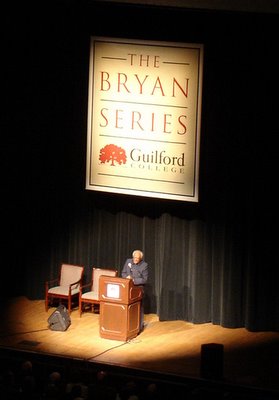It is a privilege to come to this city, the first in this country to have a Truth and Reconciliation Commission, embodying the theme of reconciling love. The world salutes Greensboro.
-- Desmond Tutu in Greensboro Thursday night, before exhorting the audience to applaud those involved with the Greensboro Truth & Reconciliation Commission
Desmond Tutu, Archbishop Emeritus of Cape Town, South Africa and Nobel Peace Prize winner, spoke to a sold out and exuberant audience in Greensboro's War Memorial Auditorium this evening.
Now Chancellor of the University of the Western Cape, Tutu was brought to Greensboro by Guilford College as part of their distinguished Bryan Series.
WUNC Public Radio is co-sponsoring the 2005-06 Bryan Series. Joan Siefert Rose, General Manager of the station, gave opening remarks and told the audience that Tutu's speech will be available for audio download at some later date on WUNC's website. [IMPORTANT NOTE: Though Rose's name was on the program, I and others mistook her for the actual speaker, a woman originally from South Africa who has newly joined WUNC. I do not know her name, but it was not Ms. Rose. My apologies.]
She also gave the good news that Dick Gordon, formerly of WBUR in Boston and the sorely-missed cancelled program The Connection, is coming on board at WUNC to launch a national radio show from the Triangle.
Next was Kent Chabotar, president of Guilford College, who very modestly yet earnestly (in other words, in a Quakerly manner) touted the Bryan Series. He and Guilford needn't be humble on this; they've brought an amazing international slate of speakers to Greensboro, and they deserve our gratitude for it. Chabotar pointed the audience's gratitude towards Joe Bryan and the former Kathleen Price Bryan Family Fund, underwriters of the series since its inception in 1994.
Tutu spoke of his experiences leading the South African Truth and Reconciliation Commission, an effort to heal the wounds of the repressive system of apartheid through restorative justice.
When we speak of justice, Tutu said, we often think of retributive justice, in which the goal is to punish the perpetrator.
"There is another kind of justice, that holds at its center the essential humanity of the perpetrator. This is restorative justice," he said. "It never gives up on anyone. It believes in the essential goodness of all. In it, the perpetrator remains a child of God, someone to be salvaged, someone to be reintegrated into society."
"God gives up on no one. It is not 'once a murderer, always a murderer.' No. No. No. You and I were made for goodness, laughter, joy, compassion, caring."
Though many characterize restorative justice as letting the perpetrators off too lightly, Tutu reminded the audience that "I'm sorry" is very difficult to say, particularly as public confession "under the glare of TV lights". He spoke of South Africans witnessing family members whom they formerly thought of as "paragons of virtue" confess to taking part in torture, or participating in death squads.
"Forgiveness is not cheap. It is not easy. Forgiveness cost God the death of God's son. But forgiveness is possible."
He spoke of victims in South Africa who came to speak to the TRC, some with horrible physical and psychological wounds. Telling their stories, sometimes forgiving their tormenters, they went away feeling that "they had contributed to the struggle -- a struggle which ended victoriously."
"Reconciliation can only happen with the truth. If you want to truly be reconciled, you often have to be confrontational."
He explained the meaning behind the concept Ubuntu - difficult to translate into English, he said. It is the idea that our humanity is tied up in the humanity of others in a "delicate network", so that "none can say that others are superfluous. A person is a person through other persons. I am because you are. I am human because I belong. Without other human beings, I wouldn't know how to speak like a human being, walk like a human being, think like a human being. I wouldn't know how to be human."
"You and I are fundamentally good. We were created by God to be like God, and ultimately for God."
The loudest applause line of the evening came when Tutu said, "We've discovered that real peace will never come from the barrel of a gun."
26 years ago, November 3rd was a dark and terrible time to be in Greensboro, a time when the city seemed to be cut off from hope.
This November 3rd, thanks in large part to Desmond Tutu and the diligent work of those inspired by him, it was a wonderful day to be in a Greensboro full of possibility.
Here's to making November 3rds of the future, officially or not, a day marked for deliberate observances of hope in this city.
UPDATE: See also Jay's and Hardy's reviews.

No comments:
Post a Comment